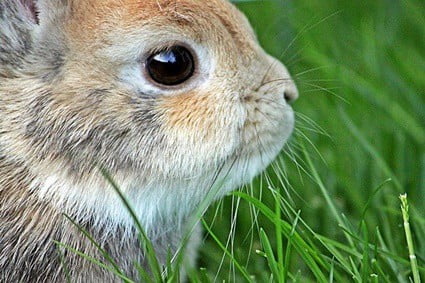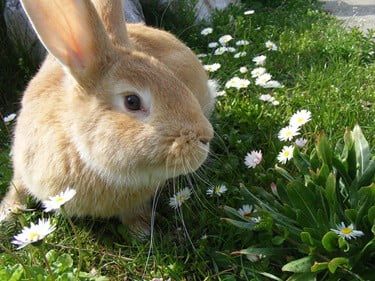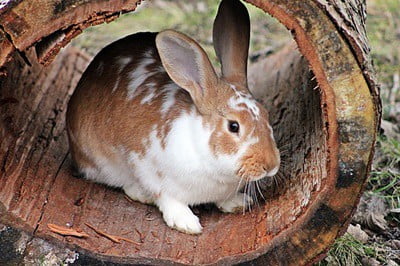Even with the most sincere affection, there may be times when your rabbit suddenly becomes unfriendly. Worse still, your rabbit may become afraid of you. This can be disheartening, leaving you feeling guilty and confused.
If your rabbit doesn’t seem to like you anymore, this usually isn’t because of something you did. Common reasons for unfriendliness in rabbits include illness, changes in their environment, loud noises, strong smells, and stress. Thankfully, this behavior will often go away in a few days, and your rabbit should be back to normal.
A hostile rabbit may express its displeasure in a number of ways. These can include not wanting to be handled, freezing, and running away.
Rabbit No Longer Likes Me
Rabbits are capable of discontentment. They express this via their own unique body language. Certain signs act as an early warning that your rabbit has encountered something bad or stressful. If your rabbit displays these signs, it may be very unhappy.
Why Does My Rabbit Dislike Me?
Most likely, your rabbit’s skittish behavior is not your fault. Even rabbits that are used to being handled can suddenly become unfriendly.
Sudden bouts of aloofness are unavoidable and expected in rabbit behavior. This is mainly because of their prey instincts and the history of their breeding.
Rabbits React Based on Prey Instincts
Despite their domestication, rabbits are still descended from their wild ancestors. Your rabbit will have reactions hardwired for its survival. One trait includes reacting negatively to being held.
To understand your rabbit, put yourself in its place. Imagine being a prey animal and being suddenly lifted off the ground. You wouldn’t think that you were being lifted for love or affection. Instead, you’d think that you are being carried off by a wolf or eagle.
No matter how often a rabbit is handled, this instinct is still at the back of its mind. That behavior can resurface in times of stress and anxiety. As a result, you’ll note a sudden change in its behavior.

Rabbits Were Not Bred To Be Pets
If you own a rabbit, it may be tempting to compare rabbits to cats and dogs. You may notice your rabbit acting unfriendly, while dog and cat owners are lovingly bonded with their pets. Rabbits, on the other hand, can take weeks to warm up to their owners.
It is unfair to compare rabbits to cats and dogs in this way. Unlike rabbits, cats and dogs are predators. They do not have the skittishness that rabbits need to survive in the wild.
Another difference between these pets is breeding. Cats and dogs have been human pets for thousands of years. Rabbits, on the other hand, were bred primarily for meat and fur, not human companionship.
Why Is My Bunny Scared Of Me All Of A Sudden?
Seemingly for no reason, your rabbit may start hiding from you, running away from you, and avoiding you. How can you tell if this is random instinct or a real problem?
Medical Issues
Because rabbits are prey animals, they are good at hiding pain. In the wild, signs of pain can attract the attention of predators. Domestic rabbits, too, have the instinct to hide their injuries or discomfort.
As such, if your rabbit has developed an injury – minor or major – it will be motivated to hide away from you and recover. It’s nothing personal. Your bunny will likely keep to itself until it feels better, and return to normal.
Changes in Environment
This doesn’t just mean a change in physical space. It can also mean people, food, toys, and even noises have entered their zone. It doesn’t even have to be harmful. Change itself can be enough to put your rabbit on edge.
Even small and unnoticeable circumstances can have an impact. For example, your rabbit’s cage-mate took a trip to the vet, you changed your working hours, or you gained a new roommate. This can cause stress in rabbits, making it appear less cuddly towards you.
Loud Sounds
Rabbits become very anxious when spooked, and loud noises are the most common culprit. Rabbits have sensitive ears. What isn’t loud for you can be loud and distressing to your rabbit.
Lop-eared bunnies are the most susceptible. Because of how their ears are designed, lops can detect more activity or softer noises. This makes them great at spotting danger, but also great at overreacting.
A loud noise from outside or a neighbor can be enough to put your rabbit in an anxious mood. If it appears unfriendly all of a sudden, consider what sounds – soft or loud – may have startled the creature.
Unwanted Smells
A rabbit may suddenly dislike you because of a smell. Rabbits are conditioned to dislike certain odors, especially those related to common predators, like cats and dogs.
Likewise, they may associate smells with bad experiences, like a previous owner’s rough handling with the scent of specific perfume. A rabbit’s sensitive nose may repel it from strong odors.
If your rabbit suddenly doesn’t like being handled, consider your smell. Have you recently handled a cat or a dog? Are you wearing a new hand lotion? Have you put on a strong perfume?
Consider the odors in your environment. Perhaps your rabbit associates the smell of cooking with a loud gathering. Maybe the new air freshener isn’t agreeing with your rabbit’s nose. If you believe that a smell is causing your rabbit stress, consider moving it to another area.
Stress And Anxiety
Rabbits get stressed out easily. It’s simply their nature as a prey animal. If, for any reason, your rabbit is stressed, don’t be disheartened when they become less cuddly. This is a normal part of rabbit behavior. Chances are, they just need time and space.
Common Rabbit Trust Issues
A scared rabbit will often return back to normal in a day or two. However, a scared rabbit can act out in different ways. Some reactions will be minor and won’t call for concern. However, other reactions can lead to the rabbit physically hurting you and itself.
Rabbit Runs Away When I Pet It
Rabbits sometimes do not like to be petted. This most often happens when a rabbit hasn’t been socialized when it was young. If you try to pet an unsocialized rabbit, it may become scared and anxious. The most common reaction of a scared rabbit is running away.
Rabbits might injure themselves when fleeing. For example, they may collide with objects that are dangerous to them. They may get stuck between objects. Or they may step on surfaces that can hurt their feet.
When this happens, it’s best to leave your rabbit alone for the moment. Allow your pet to come to you on its own terms. Gradually rebuild your trust with your rabbit before attempting to pet it.
Rabbit Freezes When I Pet It
Other than running away, a common rabbit response to fear is freezing. Freezing often comes with other symptoms of anxiety. A rabbit’s eyes may bulge, and it may hunch up.
Like running away, freezing can also be dangerous for rabbits, as it signals high levels of stress. If rabbits are exposed to extreme stress multiple times or for long periods, this may cause their health to degrade.
The solution to this is similar to when your rabbit runs away. Do not force physical affection on a rabbit. Instead, build up trust and rapport. Allow your rabbit to approach you, instead of the other way around.
Rabbit Does Not Eat from My Hand
If a rabbit suddenly stops eating from your hand, don’t be alarmed. This can be caused by three reasons, all of which are easily remedied:
- The rabbit may dislike the food. Rabbits are sensitive to unfamiliar food and can be distressed if their normal food is altered in texture, smell, or flavor. This may cause them to feel insecure.
- The rabbit may not like the smell of your hand.
- The rabbit may be confused by its instincts. Rabbits have a social hierarchy in their colonies and are often protective of food. As such, your rabbit may not see you as offering treats, so much as declaring that you own the treat.
A rabbit that suddenly stops eating from your hand isn’t a cause for concern. Simply give your pet time to realize that:
- The food is not dangerous or bad, just new.
- The smell of your hand is acceptable and not a cause for stress.
- The rabbit is allowed to take the treat without repercussions from you.
However, if your rabbit does not eat at all, this is more serious. In this case, you should bring your pet to a veterinarian.
My Rabbit Jumps Out of My Arms
Jumping out of your arms may be the most dangerous reaction of an anxious rabbit. Rabbits have delicate bones and powerful legs. As such, struggling rabbits can easily break their neck, legs, and back. The person handling them can also receive a swift kick or be scratched by sharp claws.
When the problem is fresh, the best approach is to avoid carrying the rabbit. If you need to transport the animal immediately, consider luring it with a treat to the new place or to its carrier. Over time, your rabbit may calm down and allow you to hold it. If it continually refuses to be held, you can attempt to train it:
- Start by sitting on the ground and placing the rabbit in your lap.
- Once it grows comfortable there, take the rabbit into your arms.
- If it struggles, let it go and try again later. Since you’re close to the ground, a fall will not harm the rabbit.
- After a few training sessions, if the rabbit accepts the embrace without a fight, you can begin sitting on a sofa or chair.
- If the rabbit doesn’t react poorly to the height, you can try standing and moving around.
- When the rabbit accepts this, you can hold it without further complications. Just be sure to keep it away from stressful environments or loud noises, as a startled rabbit may try to jump anyways, no matter how comfortable it is with you.
Rabbit Does Not Like To Be Handled
Rabbits, by default, do not like to be handled. They have to be conditioned to trust humans. Socialization should happen before a rabbit turns six weeks old. During this time, rabbits should be made used to the presence of humans. Rabbits at this age should also be given pets and cuddles.
If socialization doesn’t happen, a rabbit will become aloof and afraid to be handled. Rabbits can still be socialized after this, but it will require more time and effort. Here are some pointers:
- Before carrying it, get down on the rabbit’s level. Allow it to sniff your hands.
- To carry it, slip a hand under its torso, and support its behind with your other hand.
- Petting a rabbit on its torso and hindquarters can make it more comfortable being carried.
- If a rabbit squirms, place it on the ground right away.
- Never place a rabbit on its back, even if it makes handling easier. The rabbit can and will struggle. This is a prey response, according to Behavioral and Neural Biology, and thus causes stress on a rabbit.
- Scruffing, or holding a rabbit by the scruff of its neck, should never be done. It is widely considered to be distressing and painful to a rabbit, according to the Journal of Applied Animal Welfare Science.
Learn more about how to safely carry and hold your rabbit.
How To Get Your Rabbit To Trust You
In some rare cases, your stressed rabbit may not go back to normal in a few days. This may have a few possible reasons:
- If you accidentally startled your rabbit more than once, it may view you as a threat.
- It may not be well socialized.
- If you adopted a rabbit that’s had previous owners, it may display trust issues, either due to the new environment or prior bad experiences.

Talk Gently
Your rabbit may not like to be near you, but talking can help mend the gap. Remember that rabbits have sensitive hearing, and loud noises can easily spook a rabbit. Instead, make sure to always speak in a soft and gentle manner. Rabbits can also pick up on tone and emotions, so always be calm when you speak.
Get On Ground-Level
Rabbits are small and low to the ground. From their point of view, you are only a pair of feet. As such, it’s best to crouch low on the ground when you’re talking or approaching your rabbit. This can help it feel more comfortable and less threatened. You won’t be established as just a tall and domineering creature.
Observe Your Rabbit
Rabbits have unique personalities. The only way to discover their personality is through observation. Figuring out where your rabbit likes to spend its time, what toys it prefers, its favorite food, and the activities it enjoys most can be essential in building trust.
When a rabbit doesn’t like to be held, it is also best to leave it alone. Instead, have it figure out things on its own. Investigating new objects, sounds, and smells can alleviate a rabbit’s anxiety.
Be Aware of a Rabbit’s Blind Spot
Like most prey animals, rabbits have eyes located on the sides of their head. This gives them a wide range of vision to spot predators from all sides. However, this means that they have a blind spot directly in front of their face. If you pet your rabbit in this spot, you may spook it. As such, it’s best to avoid this area and stick to other spots.
Bond with Your Bunny
Bonding with your bunny is a great way to earn its trust. Start by spending time with it in a private, quiet room. Make sure the room is free of other pets or people, so you can enjoy some quality time. You can also lie down on the floor to put yourself on your rabbit’s level.
If your rabbit is still wary, try enjoying a separate task on your own, while keeping the rabbit nearby. It can then observe you and grow more comfortable with your presence. Do this a few times a day.
You can also bond with your rabbit through petting. If a rabbit allows you to feed it by hand, give it a pat on the head. Slowly, the rabbit will get used to your touches.
Provide Your Rabbit’s Basic Needs
Some rabbits may be cuddlier than others, but all of them need the same basic things. No matter its personality, your rabbit will need food, water, and attention. Make sure it has a safe place to rest, ample water, and a balanced diet.
After this, get to know your rabbit and learn how much affection it prefers. Is it cuddly? Does it like simple pets? Does it prefer to sit on your lap or just play nearby? By making sure your rabbit feels comfortable and fulfilled by its environment, it’ll feel free to expand its attention and learn to love you.

